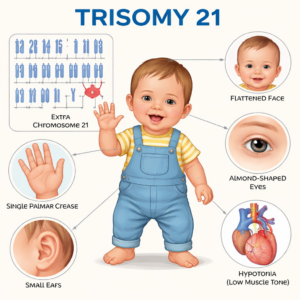As parents, our kids’ health is always top of mind, and that includes their hearts. We’re diving into the world of genetics to understand how it plays a role in our children’s heart health. Understanding genetic heart disorders can be daunting, but having the right information can empower you to support your child effectively.
What are Genetic Heart Disorders?
Genetic heart disorders are conditions caused by abnormalities in your child’s DNA that affect the heart’s function or structure. These disorders can be present at birth (congenital) or manifest later in life. Congenital heart defects, for example, affect approximately 1% of newborns.
Common Genetic Heart Disorders
Here’s a look at a few common types:
1. Hypertrophic Cardiomyopathy (HCM)
What It Is: A condition marked by the thickening of the heart muscle.
Causes: Often hereditary, linked to mutations in genes responsible for heart muscle proteins.
Symptoms: Shortness of breath, chest pain, or fainting spells, particularly during exercise. HCM is estimated to affect 1 in 500 adults.
2. Long QT Syndrome
What It Is: A disorder of the heart’s electrical activity, increasing the risk of fast, chaotic heartbeats.
Causes: Typically inherited through gene mutations affecting cardiac ion channels.
Symptoms: Fainting, seizures, or sudden cardiac arrest.
3. Congenital Heart Defects
What It Is: Structural problems with the heart or its major vessels present at birth.
Causes: Can result from genetic mutations passed down from parents.
Symptoms: Rapid breathing, cyanosis (bluish tint to the skin), or poor growth in infants.
Recognizing the Symptoms
Being aware of the symptoms can help you identify the issues early. Here’s what to watch for across many genetic heart disorders:
- Unusual fatigue or weakness
- Difficulty breathing
- Swelling of the legs, ankles, or feet
- Irregular heartbeats or palpitations
Assessment Tools and Diagnosis
How Do We Identify These Disorders?
Fortunately, there are several tools available to help diagnose genetic heart disorders:
1. Genetic Testing
What It Does: Identifies specific gene mutations linked to various heart disorders.
How It Helps: Offers a definitive diagnosis, allowing for tailored treatment plans.
2. Echocardiogram
What It Does: Uses ultrasound to create images of the heart, helping detect structural abnormalities.
How It Helps: Noninvasive and effective for evaluating heart defects and function.
3. Electrocardiogram (ECG)
What It Does: Records the electrical activity of the heart to spot irregular rhythms.
How It Helps: Quick and painless, ideal for identifying conditions like Long QT Syndrome.
Practical Tips for Parents
- Watch for Symptoms: Keep a diary of any symptoms your child experiences and share it with your healthcare provider.
- Regular Check-Ups: Schedule consistent doctor visits for early screening and timely detection.
- Discuss Family History: Share your family’s medical history with your doctor to help assess genetic risk factors.
How Family Health Checker app Can Help
In addition to the assessment tools discussed, parents may find it helpful to utilize resources like the free, AI-driven Family Health Checker app. This app allows for convenient, at-home assessment of developmental and genetic health concerns. By answering the questions and uploading the facial images, the tool can analyze genetic and developmental issues. The app provides a free report highlighting any potential concerns and can connect parents with healthcare professionals for further evaluation, including a no-cost genetic test for eligible kids. It’s important to remember that this app is a supplement to, not a replacement for, consultation with a healthcare professional for diagnosis and personalized advice regarding potential heart conditions.
Understanding genetic heart disorders is the first step in ensuring your child receives the best care possible. If you have concerns about your child’s heart health, consider speaking with your pediatrician about genetic testing and other diagnostic tools.



